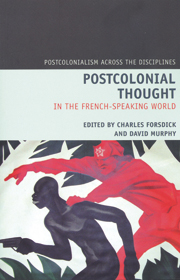Book contents
- Frontmatter
- Contents
- Acknowledgements
- Introduction: Situating Francophone Postcolonial Thought
- Section 1 Twelve Key Thinkers
- Section 2 Themes, Approaches, Theories
- 13 Postcolonial Anthropology in the French-speaking World
- 14 French Theory and the Exotic
- 15 The End of the Ancien Régime French Empire
- 16 The End of the Republican Empire (1918–62)
- 17 Postcolonialism and Deconstruction: The Francophone Connection
- 18 Negritude, Présence Africaine, Race
- 19 Francophone Island Cultures: Comparing Discourses of Identity in ‘Is-land’ Literatures
- 20 Locating Quebec on the Postcolonial Map
- 21 Diversity and Difference in Postcolonial France
- 22 Colonialism, Postcolonialism and the Cultures of Commemoration
- 23 Gender and Empire in the World of Film
- 24 From Colonial to Postcolonial: Reflections on the Colonial Debate in France
- Notes on Contributors
- Bibliography
- Index
19 - Francophone Island Cultures: Comparing Discourses of Identity in ‘Is-land’ Literatures
from Section 2 - Themes, Approaches, Theories
- Frontmatter
- Contents
- Acknowledgements
- Introduction: Situating Francophone Postcolonial Thought
- Section 1 Twelve Key Thinkers
- Section 2 Themes, Approaches, Theories
- 13 Postcolonial Anthropology in the French-speaking World
- 14 French Theory and the Exotic
- 15 The End of the Ancien Régime French Empire
- 16 The End of the Republican Empire (1918–62)
- 17 Postcolonialism and Deconstruction: The Francophone Connection
- 18 Negritude, Présence Africaine, Race
- 19 Francophone Island Cultures: Comparing Discourses of Identity in ‘Is-land’ Literatures
- 20 Locating Quebec on the Postcolonial Map
- 21 Diversity and Difference in Postcolonial France
- 22 Colonialism, Postcolonialism and the Cultures of Commemoration
- 23 Gender and Empire in the World of Film
- 24 From Colonial to Postcolonial: Reflections on the Colonial Debate in France
- Notes on Contributors
- Bibliography
- Index
Summary
The act of writing can unveil the infinite that the colonial domination tends to make us call île (or petit pays, or pays périphérique).
(Chamoiseau, 1997: 245; translated in Perret, 2006: 123)The general lack of scholarly interest in the contribution of island cultures to postcolonial debate, as underlined by the Caribbean/South Pacific scholar Elizabeth Deloughrey (2001a: 22), takes on specific dimensions within Francophone postcolonial studies. While Caribbean authors have elicited much interest, literature from the Mascarenes and the South Pacific remains to a large extent excluded both from Francophone research conducted in Europe or North America and from Anglophone postcolonial discussions of regional identity. Comparative readings have the potential, however, to reveal rifts and commonalities.
The identification of an appropriate terminology emerges as the first challenge facing such readings across cultural boundaries. French-speaking islands range in status from independent states, such as Haiti, Mauritius or ni-Vanuatu, to France's ‘far-flung extra-continental territories’ (Brown, 2005b: 42). Though the latter are still often referred to as ‘Départements and Territoires d'Outre-Mer’ (DOM-TOM), most were assigned a new status in 2003, when French Guyana, Guadeloupe, Martinique and Réunion became ‘Départements and Régions d'Outre-Mer’ (DOM-ROM), Saint-Pierre-and-Miquelon, Mayotte, French Polynesia and Wallis-and-Futuna ‘Collectivités d'outre-mer’ (CT), while the uninhabited ‘Terres Australes et Antarctiques Françaises’ (TAAF) retained its appellation. New Caledonia's status is more ambiguous. The labels ‘Pays d'Outre-Mer’ (POM) and ‘Collectivité Sui Generis’ are both used, but the status of Pays d'Outre-Mer does not appear in the 1998 Noumea Agreements.
- Type
- Chapter
- Information
- Postcolonial Thought in the French Speaking World , pp. 238 - 247Publisher: Liverpool University PressPrint publication year: 2009

